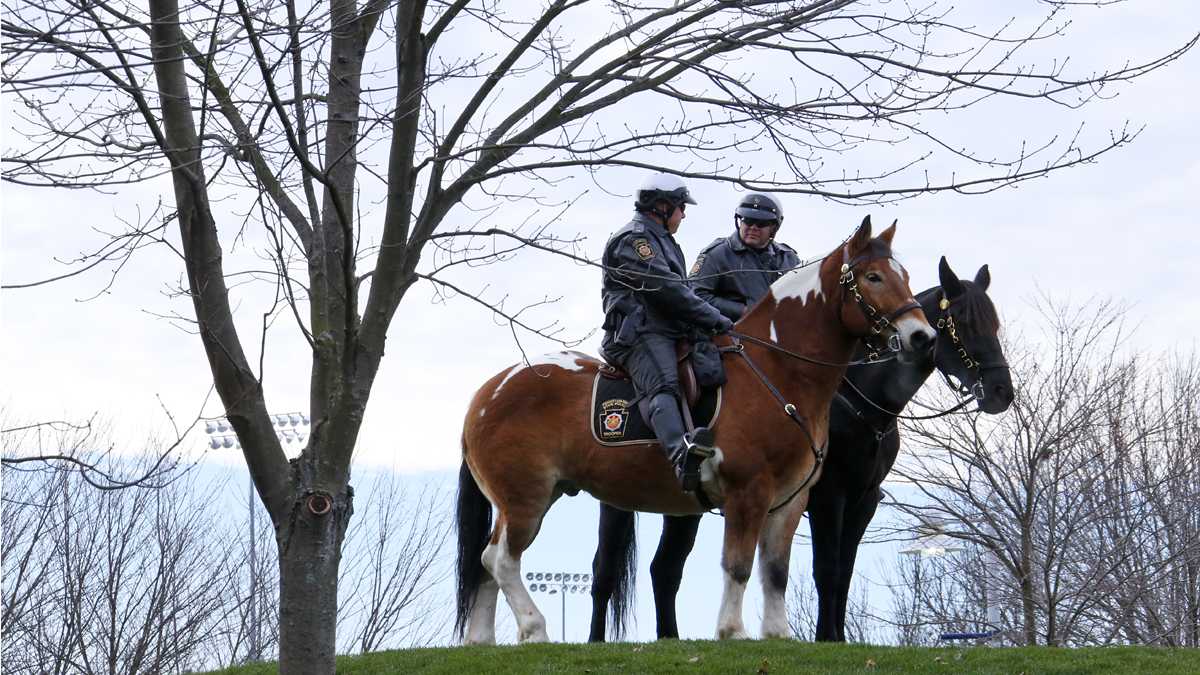Pennsylvania lawmakers advance multiple proposals for state police funding, coverage

Pennsylvania State Police on horses outside Beaver Stadium before an NCAA college football game between the Penn State and the Michigan State in State College, Pa. (AP File Photo/Gene J. Puskar)
No one has introduced legislation providing for the $25 per capita fee proposed by Gov. Tom Wolf.
State lawmakers have been considering changes to how Pennsylvania State Police provide coverage in communities without local law enforcement, and how to pay for it.
There are no fewer than five related proposals that have been introduced this session.Paying for current coverage
Rep. Mike Sturla, D-Lancaster, has introduced a bill setting out a detailed scale.
First, remember that this issue arises as the state is cutting transfers from the state’s Motor License Fund to state police. The amount was capped at $800 million last year and is scheduled to drop 4 percent annually.
Under Sturla’s proposal, communities that depend on the state police would split the difference each year. Individual amounts due would be based on population and use.
Municipalities that start relying on state police for local patrols in the future would have to enter contracts. They’d pay based on population, geographic area, crime rate and any other factors deemed relevant by the State Police Commissioner.
Communities would be exempt from payment if they’re deemed distressed.
(All municipalities currently in the state’s Act 47 program have their own local police department. The Mercer County borough of Greenville has a combined department with West Salem).
Municipalities also wouldn’t have to pay if they provide law enforcement coverage for a certain number of hours per week relative to their population.
Sturla has introduced similar legislation at least four times before.
State Rep. Stan Saylor, R-York County, has proposed a payment threshold of 10,000 residents or population density of 160 people per square mile.
A total of 21 communities rely on state police currently. Fourteen of them, or two-thirds, would have to start paying under the density part of Saylor’s proposal; statewide, it would apply to nearly 400 (about 30 percent of) state police-dependent communities.
In the Senate, Berks County Democrat Judy Schwank is backing a bill that would divert liquid fuel tax revenues to cover state police patrol costs in municipalities with more than 5,000 residents.
The vast majority of communities relying on state police (1,185 of nearly 1,300) wouldn’t be affected, including Schwank’s hometown of Ruscombmanor Township.
No bills have been advanced to implement the $25 per capita fee proposed by Governor Tom Wolf. A spokesman for the governor said legislation is being drafted, but declined to provide a timeline for introduction or other specifics.
Enhancing service
Any of these would apply to Republican Senator Kim Ward’s hometown: Hempfield Township, Westmoreland County.
At 43,000 residents, the municipality is the largest relying solely on state police.
“Whenever we had something happen — like, for real — they were there in two seconds,” Ward says. “But with all drugs happening on Route 30 corridor, … I think to have more troopers available would be a deterrent and a help.”
Ward’s remarks came during a hearing this week on her own bill, which would let townships and boroughs pay for their own trooper. Single municipalities could establish their own agreements, or partner with adjacent communities for collective contracts.
Elam Herr, from the Pennsylvania State Association of Township Supervisors, noted the importance between Ward’s bill and other measures calling for some of population-driven payment.
“A majority of my members could raise the tax somewhat to offset costs somewhat if they’re getting something. But the big problem with (other) proposals is that the service won’t change,” Herr. “Under this proposal, the services will change. You’ll get something for money you’re putting out for these troopers.”
Ward stressed troopers would remain under the jurisdiction of the state police, not local officials, and would not enforce municipal ordinances (which could be a logistical nightmare, according to testimony from Deputy State Police Commissioner Lt. Col. Stephen Bucar).
Ward also emphasized that these agreements would be voluntary.
State Rep. Seth Grove, R-York, also has introduced a state police contract bill. But Grove’s proposal would mandate contracts for state police coverage in any borough or township that’s done away with local law enforcement since 2013.
There are no cities on the state police’s list of municipalities that don’t handle any of their own police coverage.
WHYY is your source for fact-based, in-depth journalism and information. As a nonprofit organization, we rely on financial support from readers like you. Please give today.



